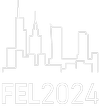Anisotropic multiplicative bias in weak lensing shear estimates
2020.11.18 12:41 - Katarzyna KuźniarGravitational weak lensing, the weak regime of gravitational lensing phenomena, arises in the sky as a slight shape distortion of observed galaxies, quantified as a change in their ellipticity. As the only information of a galaxy's ellipticity that we have is in the observation itself, the gravitational effect has to be extracted statistically. Simply speaking, the intrinsic shape of a set of galaxies at an astronomical frame would stack to that of a circle, therefore, any deviation from this stacked shape would be produced by some mass distribution.
This Master Thesis project was dedicated to characterize the systematic effects that can bias the measurements in weak lensing and cosmic shear surveys of the shear, a main quantity to characterize weak lensing studies. We produced highly simplified simulations of astronomical frames, with a uniform shear applied to the galaxies, using the Stuff/SkyMaker package, and then applied the KSB shear estimation method. The formalism used to calibrate the measurement systematics, called calibration bias, differs from the one found usually in the literature by the introduction of extra cross-components.
| Attachment | Size |
|---|---|
| 15.41 KB | |
| 179.36 KB |













